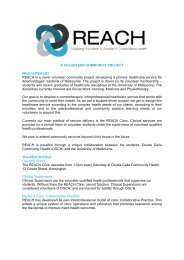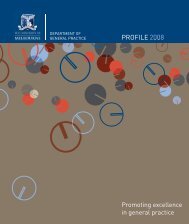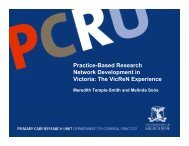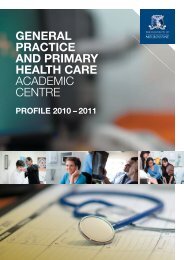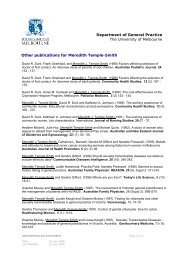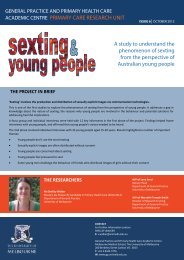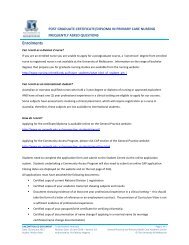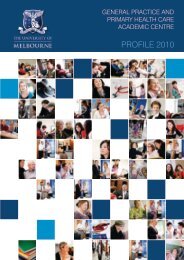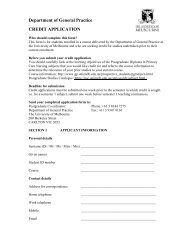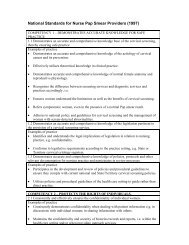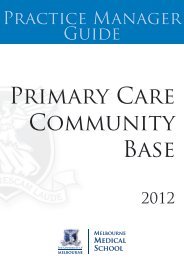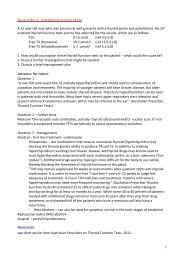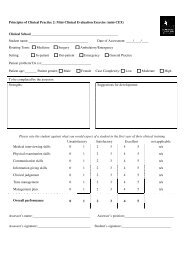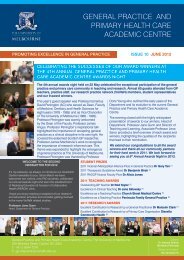Quiz topic 1 - General Practice and Primary Health Care Academic ...
Quiz topic 1 - General Practice and Primary Health Care Academic ...
Quiz topic 1 - General Practice and Primary Health Care Academic ...
You also want an ePaper? Increase the reach of your titles
YUMPU automatically turns print PDFs into web optimized ePapers that Google loves.
PCCB Tutorial 7 – Assessment preparation<br />
The final PCCB tutorial will consist of two parts:<br />
A. OSCE practice<br />
B. Clinical <strong>Quiz</strong> – for short answer question practice<br />
A. OSCE <strong>Practice</strong><br />
All students should have prepared one OSCE station for their peers to complete. This involves<br />
creating a ‘case’, preferably based on a patient seen at the PCCB clinic, <strong>and</strong> designing a marking<br />
sheet for that case.<br />
Students will be divided into 2 groups – each group will run two OSCE stations of 10 minutes each.<br />
For each station:<br />
• The student who has prepared the station will play the patient.<br />
• Another student will interview the patient (the exam c<strong>and</strong>idate)<br />
• A third student will mark the interviewer (the examiner) assisted by a fourth student<br />
At the end of each station, give some feedback.<br />
B. Clinical <strong>Quiz</strong><br />
Five clinical scenarios with questions will be discussed by the whole group.<br />
QUIZ TOPIC 1 – THYROID FUNCTION TESTS<br />
A 31 year old man who was previously well presents with a thyroid goitre <strong>and</strong> palpitations. His GP<br />
ordered thyroid function tests <strong>and</strong> he has returned for the results, which are as follows:<br />
TSH 0.15 mU/l (ref 0.5-5.0)<br />
Free T4 (thyroxine) 29.2 pmol/l (ref 11.0-21.0)<br />
Free T3 (triiodothyronine) 5.7 pmol/l (ref 3.1-6.0)<br />
1. How would you explain these thyroid function tests to the patient – what could the cause be?<br />
2. Discuss further investigations that might be needed<br />
3. Discuss a brief management plan<br />
Resource<br />
see short article from Australian Prescriber on Thyroid Function Tests, 2011.<br />
1
QUIZ TOPIC 2 – BOWEL CANCER SCREENING<br />
A 45 year old woman comes to your general practice to ask you about bowel cancer screening.<br />
1. What questions would you ask her to determine her risk of bowel cancer?<br />
2. She has no personal history <strong>and</strong> is currently asymptomatic, but based on the answers to her<br />
family history the following genogram is developed. Based on this, what screening, if any, would<br />
you recommend?<br />
3. When is FOBT recommended for the general population?<br />
4. The patient wants you to describe what is involved in having a colonoscopy performed. What would you<br />
advise her? What are the risks?<br />
Resources<br />
Familial aspects of bowel cancer – Cancer Council<br />
QUIZ TOPIC 3 – RHEUMATOLOGY<br />
A 66 year old woman comes to your general practice with 6 months of gradually worsening<br />
bilateral shoulder pain <strong>and</strong> stiffness <strong>and</strong> has lost 4kg. There is pain <strong>and</strong> stiffness in both shoulders<br />
<strong>and</strong> some pain in her hips. The pain is worse in the morning <strong>and</strong> can be so severe that she finds it<br />
difficult to wash/comb her hair. There is no history of antecedent injury or different activity at the<br />
time of onset. She has trialled NSAIDs with mild benefit.<br />
She has no personal history of prior joint pains <strong>and</strong> there is no history of rheumatological disease<br />
in the family. She has been on statin therapy for 3 years for hypercholesterolaemia (but no recent<br />
changes to her medication).<br />
<strong>General</strong> appearance: fatigued BMI 23, no pallor, pink conjunctivae; Vitals: BP 130/80 HR 72 reg<br />
Shoulder: restricted ROM in all movements, restricted to 60 degrees abduction/flexion (bilateral).<br />
Hips: restricted ROM in all movements (bilateral)<br />
Cardio: Normal S1-S2, nil added; Resp: nad; Abdo: nad; Neuro: nad<br />
No visual changes, no scalp tenderness or tenderness over temporal arteries<br />
1. What are the differential diagnoses?<br />
2. What tests would you order?<br />
3. What are some appropriate management options for this patient?<br />
2
QUIZ TOPIC 4 – BREAST LUMP<br />
A 37 year old female presents to you with a left breast lump that she has just noticed in the<br />
shower yesterday for the first time. It is not painful. She is very anxious because she is worried<br />
about cancer. She has no past medical history. She has a 3 year old son who she breast fed for 6<br />
months <strong>and</strong> then went back to work. She has just finished her menstrual period. She is using<br />
condoms for contraception at present although used the combined oral contraceptive pill for<br />
many years prior to conceiving. She smoked for 5 years until she gave up at the age of 23.<br />
Family history: Maternal aunt diagnosed with breast cancer aged 55years <strong>and</strong> is still alive.<br />
Paternal Gr<strong>and</strong>mother breast cancer aged 70 years <strong>and</strong> survived until the age of 80 years. No<br />
family history of any other cancer including ovarian, bowel, prostate, pancreas etc.<br />
1. What would you do on examination?<br />
2. What would the differential diagnosis be for a woman with a discrete lump at this age?<br />
3. Would you do any investigations? What is the triple test?<br />
4. Assuming a benign result now, when should she commence mammogram screening?<br />
Resource<br />
National Breast Cancer Centre – Investigation of a new breast symptom, 2006<br />
QUIZ TOPIC 5 – DIABETES<br />
A 55 year old man presents worried he may have diabetes, as he has developed a fungal groin rash over the<br />
last few weeks <strong>and</strong> is very tired. He has searched the internet <strong>and</strong> feels that he has several of the diabetes<br />
risk factors.<br />
1. How would you determine his risk of type 2 diabetes? Are there any online tools that you can use to<br />
assist?<br />
2. What tests would you order to determine whether he has diabetes?<br />
After testing you determine he does have type 2 diabetes.<br />
3. What are the key management points in managing type 2 diabetes? Include in your answer issues around<br />
monitoring, drug <strong>and</strong> non-drug treatments, health promotion etc.<br />
Resource<br />
For more information about the management of T2 diabetes in general practice, see:<br />
http://www.diabetesaustralia.com.au/Documents/DA/What%27s%20New/12.10.02%2<br />
0Diabetes%20Management%20in%20<strong>General</strong>%20<strong>Practice</strong>.pdf<br />
3



